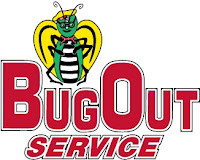Consumers are looking for environmentally responsible
products in unlikely places
INDIANAPOLIS — April 22, 2011 — The ever-expanding “green” movement made headlines with the release of “An Inconvenient Truth,” former Vice President Al Gore’s award-winning documentary on global warming. Now scores of environmentally responsible products are now being offered — hybrid vehicles, energy-efficient light bulbs, termite control … termite control? That’s right, now even termite control can leave a smaller footprint on the environment.
Right now in many parts of the United States, subterranean termites are “swarming,” leaving their colonies to form new ones. To treat their subterranean termite infestations, some homeowners have liquid chemicals added to the soil around and beneath their home. While treated soil provides termite protection for a finite amount of time, research shows that when homeowners consider termite treatment options, they indicate a high level of concern about the use of chemicals in and around their homes and the environmental implications.1
In part to encourage and recognize development of pesticides with lower environmental impact, the U.S. Environmental Protection Agency (EPA) created the Reduced Risk Pesticide Initiative, a program that expedites the review and regulatory decision-making process of pesticides that pose fewer risks to human health and the environment than existing conventional alternatives.
Termite Control “Goes Green”
Homeowners are now “going green” by selecting an alternative to liquid chemical treatments — the Sentricon® Termite Colony Elimination System, the first termite baiting technology that was made available to homeowners. The premier bait used in the Sentricon System was the first termite treatment active ingredient accepted for registration by the EPA’s Reduced Risk Pesticide Initiative. The Sentricon System also is the only termite control product ever to receive the Presidential Green Chemistry Challenge Award, one of the U.S. government’s top environmental honors. The award, presented by the EPA on behalf of the President, recognizes technical innovation that incorporates the principles of green chemistry into design, manufacture and use.
"The Sentricon System is environmentally responsible because it uses just grams of termite bait to eliminate termite colonies,” says Dave Maurer, portfolio manager for the Sentricon® System. “Every home treated with the Sentricon System instead of a liquid chemical treatment helps reduce the impact of pesticides on the environment. The Sentricon System also provides better control than liquid chemical treatments because it is monitored on an ongoing basis by an Authorized Operator and it eliminates termite colonies, not just individual termites.”
Bug Out Service, an Authorized Operator of the Sentricon® Termite Colony Elimination System, offers this method of termite control, states Paul Felker, “because the Sentricon System is the best protection from termites because it eliminates the colony, is limited in the environment and is less intrusive to homeowners.” Many homeowners agree. The manufacturer, Dow AgroSciences, conducted research in 11 high-termite-pressure markets across the country, and discovered that most homeowners feel that the environmentally responsible attributes of the Sentricon System are preferred over those of the leading liquid termiticide. “We are pleased to offer this revolutionary technology to our customers,” states Paul Felker.
Homeowners can visit www.sentricon.com to determine if their homes are at risk for termite infestations, as well as learn more about environmentally responsible termite control. Or, contact Bug Out Service for more information at 904-743-8272 or visit us at bugoutservice.com .
1Jefferson Davis Associates
2Jefferson Davis Associates
®Trademark of Dow AgroSciences LLC
Always read and follow label directions.









